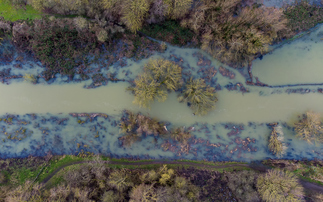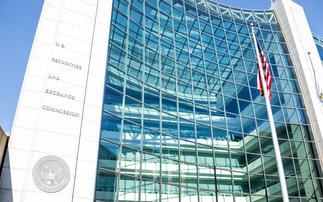James Murray reflects on a dispiriting and inspiring day, as IPPR declares #ThisIsACrisis
Should we call the interlocking challenges presented by escalating climate risks, accelerating biodiversity loss, and related economic and security threats a 'crisis'? That was the question that dominated proceedings at a conference hosted yesterday by IPPR to mark the launch of the think tank's sweeping new report on the interlocking environmental cataclysms we now face.
It was, of course, a leading question given the official title of the conference was 'Responding to Environmental Breakdown' and the hashtag for the event was #ThisIsACrisis. The temptation was to reply to the question 'is this a crisis?' with the answer, 'yes, next question'. There were a handful of dissenting voices (more of which later), but concurring with the event's central premise proved a temptation few of the panelists - your correspondent included - were able to resist.
Are we facing a crisis? Well, as the IPPR report pointed out, since 1950 the number of floods has increased by a factor of 15, extreme temperature events by a factor of 20, and wildfires seven-fold, top soils are being lost at a worrying rate, and the 20 warmest years since records began have been in the past 22 years.
You could add, and I did, that hundreds of people died recently in wildfires in California, the UN says the first spike in global hunger this century is being exacerbated by climate change, biodiversity seems to be in chronic decline, we are on track to lose 95 per cent of the world's corals within a handful of decades, and our tax takes and pensions are dependent on revenues from an industry that is likely incompatible with human civilisation continuing in anything like its current form in the latter part of this century.
If that does not amount to a crisis, what does? If the definition of a crisis is "a time of intense difficulty or danger" or "a time when a difficult or important decision must be made", then how does the rapid breakdown of the environmental systems that have sustained the global economy not qualify?
Moreover, you can hardly accuse our media and political class of placing the highest bar on what qualifies as a 'crisis'. It is called a crisis when a few people on the same football team are injured. A small band of political obsessives managed to convince a majority of people who had previously dismissed such concerns as largely irrelevant to their lives that the UK was facing a crisis of 'sovereignty' and they have taken the country to the brink of its biggest economic and constitutional convulsion since the Second World War as a result. And now we want to clutch our pearls and be cautious in calling the current and worsening litany of global environmental breakdowns a crisis? Seriously?
The more interesting questions, then, are not whether we are in the midst of environmental crisis - we are - but why have we been so reluctant to call it what it is? And what does it mean for businesses, politics, and society to publicly recognise and accept the gravity of the situation?
Opening today's conference Professor Chris Rapley offered one explanation for the reluctance to call a crisis a crisis: good old fashioned academic caution combined with a psychological survival instinct. "Climate scientists have been the most effective at disavowing what we know, because if we think about what we know it gets very scary," he conceded, adding that there is a constant desire to focus on computer screens and ice samples, "because we know when we look at what they show we see it is very, very scary - it is a crisis".
Offering perhaps the most terrifying data point of the day Rapley reminded the audience that if you have wet bulb temperatures of over 35C then after a few hours your organs start to fail. It may be among the worst case scenarios, but it remains conceivable that within a century or two large parts of the Earth will become practically uninhabitable.
An alternative explanation for the failure to give environmental breakdown the 'crisis' treatment came from Labour's Clive Lewis, who argued it is difficult for politicians to reach for the word when it contains such an obvious tacit condemnation of the economic and political system that has held sway for decades.
"If you accept we have a crisis then it is an admission the system you are adhering to is flawed," he said, adding that the logical next step from that conclusion is that you urgently need a new approach to politics and economics that is "bold, big, and radical". Lewis and his allies on parts of the left envisage a system where "you don't throw the baby out with the bath water", you still harness the power of business to innovate and invest, but you also "get past the idea the state is inherently bad" and use the power of the state to deliver some of the low carbon infrastructure we need, in the process providing a clear signal to the private sector and "crowding in" business investment and innovation. It is notable IPPR's report came as Labour provided the clearest hint yet it is planning its own Green New Deal style climate action blitz.
However, the most common rationale for being frit of the "c word" is that it risks being seen as scare-mongering, a sure-fire way to alienate key stakeholders and spark responses that range from denialism to fatalism with a side order of apathy.
This is an entirely understandable and reasonable fear, and has stopped the environmental movement and green businesses fully embracing the crisis narrative throughout a decade in which the sense of global environmental crisis has only grown.
Sam Richards of the Conservative Environment Network offered the best counter to the idea we are facing a "crisis", warning that not only does it risk putting off key moderate and centre right voters, it also risks resulting in poor decisions from political and business leaders. "People facing a personal crisis often make bad decisions," he counseled. "Do we want a government to be making decisions while constantly in crisis mode?"
Equally, what happens when the crisis is not immediately solved, when, if anything the crisis gets worse? Can a narrative of environmental breakdown be sustained and still prove useful when in 12 years' time deep decarbonisation targets are almost certainly missed and apocalypse does not result? Is there a risk the crisis narrative is co-opted by the unashamedly socialist movement pushing for a US Green New Deal and inadvertently (or deliberately) implodes any hope of climate action being pursued on a bipartisan basis?
These are legitimate concerns. But what yesterday's conference hammered home is that these fears run slap bang into the reality that the tried and tested pursuit of 'don't scare the horses' coalition-building and incremental change has not resulted in cuts in global greenhouse emissions or reversals in biodiversity loss - there is a growing sense that time has run out for the softly, softly approach. And ultimately incrementalists only have themselves to blame.
There are plenty of dangers contained in a crisis-response to environmental threats. But as Rapley joked, "nature is our life support system. If you were in the Space Station and one of the astronauts started to try and break the oxygen supply you would try and stop them, you would not try to tax them, you would stop them." Or as economist Dimitri Zenghelis put it, we are facing a crisis and to call it something else is misleading. "If you fear calling it a crisis you end up adhering to the narrative of your critics and saying things you don't believe," he warned. "But calling it a crisis doesn't mean you can't talk to optimism and self-interest as well."
In short, there is value in telling the truth, no matter how uncomfortable that truth may be. And referring to environmental breakdown as a crisis should support rather than undermine the narrative that clean technologies and infrastructure can help avert this looming catastrophe. As Greta Thunberg memorably put it, "we cannot solve a crisis without treating it as a crisis".
Who is right in this semantic debate? What is particularly interesting about the current moment, about the flurry of activity and media interest since last year's IPCC report, the build-up of campaigning muscle ahead of the critical double-whammy of the 2020 US presidential election and the Paris Agreement coming into full effect, and the emergence of exciting new voices in the climate debate, such as Thunberg and Alexandria Ocasio-Cortez, is that we are about to find out.
By luck or by design - and no doubt helped by the wider sense of crisis fuelled by the looming Brexit crunch and the global march of authoritarian strongmen - the terminology of environmental crisis and unyielding urgency is forcing its way into the mainstream. With UK school strikes on the way, the Green New Deal making waves around the world, the Davos elite flagging environmental threats as the biggest risk facing the global economy, and Extinction Rebellion, Sunrise Movement, and many other campaign groups mobilising fast, we are about to find out if demands for an emergency response to the climate crisis galvanise or alienate.
As climate change lawyer and Extinction Rebellion activist Farhana Yamin noted yesterday in a hard-hitting address, "there's something in the air - a sense that we have to get a bit radical", before quickly adding that one of the things British society should be most proud of is its pragmatic ability to deliver "profound change, peacefully".
What does that something in the air mean for businesses? It is the same dichotomy of risk and opportunity that has always characterised the low carbon transition.
On the risk side the huge economic threats presented by environmental breakdown are now being accompanied by the dawning realisation that if the public does come to regard climate change as a genuine crisis then acceptance of polluting business models could disappear overnight. On top of everything else, the much coveted 'license to operate' is under greater threat than at any point in modern corporate history. You can see how many leading businesses have grasped this reality far faster than their political counterparts and are now working hard to bolster their sustainability credentials and pivot towards offering greener products.
This pivot is driving an alternative narrative. If we are facing a crisis - and we are - then a crisis needs heroes. The opportunity is there for green business leaders, clean tech entrepreneurs, and political pioneers to emerge as the saviours who steer the ship away from the rocks. Talk of crisis should embolden, not scare, those businesses who can help avert environmental catastrophe.
As Zenghelis observed in an explanation of Paul Romer's Nobel Prize-winning endogenous growth theory, it is possible for policy and innovation to interact in a way that unlocks a better, cleaner, and more productive economy, which builds support for bolder policies and innovation, which in turn leads to a better, cleaner, and more productive economy, and so on. The virtuous circle can deliver change far faster than economists expect.
As I was leaving the conference I bumped into an executive from LEVC, the company behind the plug-in hybrid black cabs that are now a common site on the capital's roads. I've become slightly obsessed with these low emission taxis and how frequently they quietly cruise past when I am walking to work. I asked how many had been sold since their launch. He said there are now over a 1,000 on London's roads - that's over five per cent of the capital's fleet of black cabs in little over a year and demand is continuing to accelerate. The vision of an ultra low emission taxi fleet, something that was just a pipe dream a few years ago, is now firmly within reach.
Crises are scary, the environmental crisis is genuinely terrifying, but if you treat it as a crisis you might just be able to solve it. Change can happen faster than you think. Is it a crisis? Of course it is, but that does not mean it is not an opportunity as well.
This post first appeared as part of BusinessGreen's exclusive daily Overnight Briefing, which is available to all subscribers










